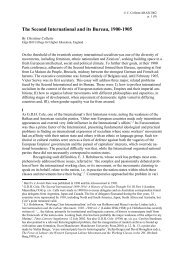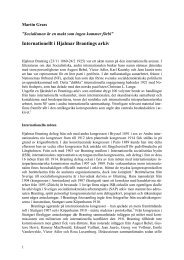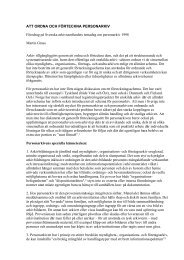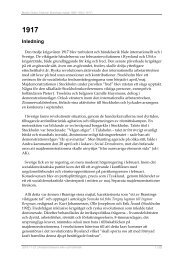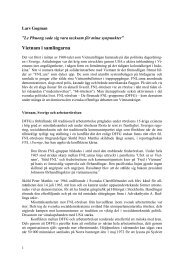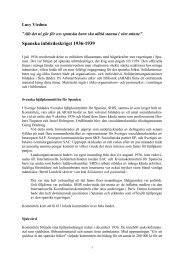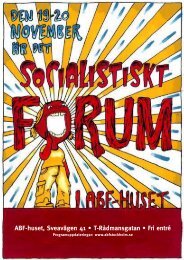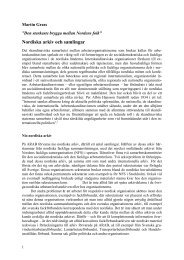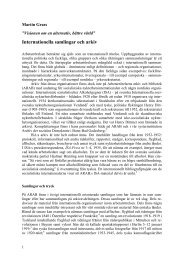Communism, Social Democracy and the Democracy Gap
Communism, Social Democracy and the Democracy Gap
Communism, Social Democracy and the Democracy Gap
You also want an ePaper? Increase the reach of your titles
YUMPU automatically turns print PDFs into web optimized ePapers that Google loves.
© S. Berger/ARAB 2002<br />
p. 9 (14)<br />
Hungary on 30 October <strong>and</strong> <strong>the</strong> withdrawal of Hungary from <strong>the</strong> Warsaw Pact on 1<br />
November 1956. In Western Europe, <strong>the</strong> invasion of Hungary by Warsaw pact troops on 4<br />
November 1956 <strong>and</strong> <strong>the</strong> swift restoration of a dogmatic Communist regime at long last<br />
loosened <strong>the</strong> bonds of large sections of <strong>the</strong> intellectual left to <strong>the</strong> Soviet Union <strong>and</strong> <strong>the</strong><br />
Communist project in Eastern Europe. The critique of Stalinism in <strong>the</strong> West went toge<strong>the</strong>r<br />
with a continuing commitment to anti-capitalism which made left intellectuals explore<br />
alternative routes to overcoming <strong>the</strong> capitalist systems of <strong>the</strong> West. E.P. Thompson's<br />
concerns with <strong>the</strong> morality (ra<strong>the</strong>r than <strong>the</strong> economics) of capitalism <strong>and</strong> his emphasis on<br />
<strong>the</strong> lived experience of workers under capitalism were a direct reaction to his rethinking of<br />
<strong>Communism</strong> in <strong>the</strong> wake of 1956. His concern for <strong>the</strong> agency of working people was also<br />
a concern with <strong>the</strong> ways in which people organised <strong>the</strong>ir everyday lives. 37<br />
In <strong>the</strong> 1960s <strong>the</strong> students were enamoured by Max Horkheimer's attacks on<br />
'integral statism' (integraler Etatismus), a concept first put forward in Horkheimer's<br />
Californian exile in 1942. He argued that <strong>the</strong> 'authoritarian state', whe<strong>the</strong>r of <strong>the</strong> capitalist<br />
or communist variant, had perfected its power mechanisms to such a degree that it could<br />
function without reference to open terror. In capitalist states, <strong>Social</strong> Democratic parties<br />
<strong>and</strong> trade unions had become part <strong>and</strong> parcel of <strong>the</strong> authoritarian state. These former<br />
interest organisations of workers had reduced notions of progress to <strong>the</strong> advancement of<br />
state capitalism. The real enemy of Horkheimer's forceful essay was bureaucracy <strong>and</strong> <strong>the</strong><br />
bureaucratic state. The aim was to create spaces for individuals to make decisions about<br />
<strong>the</strong>ir lives which are not predetermined by overpowerful <strong>and</strong> centralised bureaucracies. 38<br />
The significance of 1968 for <strong>the</strong> left in Europe lay in its championing of antiauthoritarianism<br />
<strong>and</strong> its formulation of a new democratic politics of <strong>the</strong> everyday which<br />
declared proudly that <strong>the</strong> personal was <strong>the</strong> political. It highlighted <strong>the</strong> agency that people<br />
had over <strong>the</strong>ir lives <strong>and</strong> contrasted such practices of self-actualisation with <strong>the</strong> alienation<br />
produced by passive consumerism. 39 At <strong>the</strong> universities students experimented with new<br />
democratic forms of teaching <strong>and</strong> learning. In <strong>the</strong> wake of <strong>the</strong> student rebellion of <strong>the</strong><br />
1960s we also witness <strong>the</strong> birth of a strong feminist movement. One of its key concerns<br />
was <strong>the</strong> liberation of women who arguably suffered most from <strong>the</strong> authoritarian regulation<br />
of gender relations. Women's liberation movements sprang up across Western Europe <strong>and</strong>,<br />
organised in small localised groups committed to democratic procedure, co-ordinated<br />
imaginative campaigns for <strong>the</strong> legalisation of abortion <strong>and</strong> against a wide array of<br />
discriminatory <strong>and</strong> degrading practices directed against women. Giving women <strong>the</strong> rights<br />
over <strong>the</strong>ir own bodies (reproductive rights) as well as access to jobs, equal pay <strong>and</strong><br />
generally access to social <strong>and</strong> political power, <strong>the</strong>se were among <strong>the</strong> most important<br />
dem<strong>and</strong>s made by feminists, <strong>and</strong> all of <strong>the</strong>m were closely related to questions of<br />
democracy. 40<br />
The Green movement picked up <strong>the</strong> criticisms of Communist <strong>and</strong> <strong>Social</strong><br />
Democratic notions of progress that had been voiced by left-wing dissenters in <strong>the</strong> 1950s<br />
<strong>and</strong> 1960s. Quality of life, <strong>the</strong>y argued, could not be measured simply in terms of<br />
maximising economic growth levels <strong>and</strong> rising consumption levels. Such progress had led<br />
to alienating forms of consumerism <strong>and</strong> to <strong>the</strong> ruthless exploitation of nature. It had<br />
brought <strong>the</strong> planet to <strong>the</strong> brink of global self-destruction. What was urgently needed was a<br />
37 See, for example E.P. Thompson, The <strong>Communism</strong> of William Morris: A lecture by Edward Thompson<br />
given on 4 th May 1949 in <strong>the</strong> Hall of <strong>the</strong> Art Workers' Guild, London (London, 1965), p.18.<br />
38 Max Horkheimer, 'Autoritärer Staat', in: idem, Gesellschaft im Übergang (Frankfurt/Main 1981).<br />
39 Ronald Fraser et al., 1968: A Student Generation in Revolt (New York 1988); David Caute, The Year of<br />
<strong>the</strong> Barricades: A Journey through 1968 (New York 1988).<br />
40 Monica Threlfall (ed.), Mapping <strong>the</strong> Women's Movement: Feminist Politics <strong>and</strong> <strong>Social</strong> Transformation in<br />
<strong>the</strong> North (London 1996).



